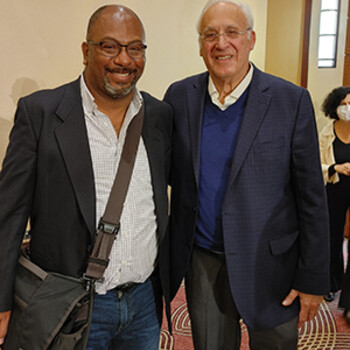SELA Returns for Three-Day Conference on Threats to Democracy

After a three-year hiatus, SELA 2022 — “Fixing the Ship at Sea: Threats to Democracy and Efforts to Rebuild” — was held from June 9–12 in Santiago, Chile. About half of the approximately 20 papers written for and discussed at the three-day conference were holdovers from the program originally planned for June 2020 and half were new papers.
Usually held every summer, the Seminario en Latinoamérica de Teoría Constitucional y Política — the Seminar in Latin America on Constitutional and Political Theory (SELA) — brings together scholars from Argentina, Brazil, Chile, Colombia, Cuba, Ecuador, Jamaica, Mexico, Paraguay, Peru, Puerto Rico, Spain, and the United States. The conference aims to “deepen understanding of complex theoretical issues, model a more discussion-oriented form of intellectual discourse than is the norm in Latin America, and create a venue for the formation of a professional community.”
SELA has added two new partner law schools, the University of Miami and the University of Arizona, the first U.S. law schools to join the project since it began in the early 1990s. SELA also celebrated the promotion of three of its members, all women, to the constitutional courts of Chile, Colombia, and Ecuador. Four other SELA members, two women and two men, have become the deans of partner schools, bringing the total number of high court judges in the group to four and the number of deans or rectors to seven.

The papers addressed topics ranging from the roles and strategies courts and judges can deploy in constitutional democracies to resist authoritarianism; strategies used by authoritarian regimes in constitutional democracies to maintain power; the legitimacy of populism; property, democracy, and inequality; international courts, transitional justice, and democracy; and the consequences for democracy of the construction of the “Other.” Law School faculty and graduates who presented or commented sessions include Simeon E. Baldwin Professor of Law Claire Priest ’00; Elizabeth Iglesias ’88; Eleanor Marie Brown ’99; Leonardo Filippini ’06 LLM; Diego Werneck Arguelhes ’08 LLM, ’14 JSD; Fernando Muñoz Léon ’08 LLM, ’11 JSD; Guillermo Arribas ’17 LLM, ’22 JSD; Jorge Contesse ’05 LLM, ’14 JSD; Rodrigo Correa ’96 LLM, ’08 JSD; Francisca Pou Giménez ’99 LLM, ’05 JSD; Gabriel Bouzat ’88 LLM; and Alejandro Madrazo ’03 LLM, ’06 JSD.
Professor Samuel Issacharoff ’83 of NYU Law gave the Robert H. Burt ’64 keynote address on the deepening fragility of democratic institutions and possible constitutional remedies. His keynote delivery was especially significant since Issacharoff played a crucial, if indirect, role in the creation of SELA.
As Issacharoff recounted, during a series of lunches he had with Argentine jurists Carlos Nino and Jaime Malamud Goti after graduating from Yale Law School in 1983, Nino came up with the idea of organizing a group of U.S.- and U.K.-based philosophers and legal scholars to observe the criminal trials of the leaders of Argentina’s military junta. Issacharoff enthusiastically recommended that Law School Professor Owen Fiss be included in the group, which would eventually include Ronald Dworkin, Tim Scanlon, Thomas Nagel, and Bernard Williams. During their 1986 trip to Argentina, Owen Fiss formed a close friendship with Carlos Nino, who died prematurely in 1993, leaving many devoted friends and students behind. The idea for SELA was born while Fiss and Burt gathered over coffee one spring day in 1995 with Roberto Saba ’95 LLM, ’11 JSD; Lucas Sierra ’96 LLM; and Victor Ferreres ’92 LLM, ’96 JSD.
SELA 2022 featured a “Democracy Roundtable,” at which outside experts were invited to discuss the state of democracy in the host country. Even though the Chilean convention delegates were still hurrying to finish the drafting and harmonization of the text that will either be approved or rejected by popular vote on September 4, three key delegates representing the conservative, progressive, and indigenous factions made time to give presentations. They were joined by Chile’s Minister of the Economy and the session was moderated by Daniela Salazar. Despite the obvious differences of opinion and outlook, and thanks in part to Salazar’s adept moderation, the discussion mirrored the honest yet probing and respectful debates that characterize SELA.
It is SELA’s practice to organize collateral presentations and events at partner universities before and after SELA. This year, the four Law School students who attended SELA gave presentations at the University of Chile on June 8 and Diego Portales University on June 9; Guido Calabresi Professor of Law Daniel Markovits ’00 gave a lecture at the Adolfo Ibáñez University (UAI) on June 14. At the University of Chile, Rafael Bezerra Nunes ’18 LLM described his research on the transformations in the judiciary contemplated by Chile’s Constitutional Convention and Luke Connell ’22 discussed his research on the rights and representation of migrants in the constituent process. At Diego Portales, Hannah Carrese ’22 discussed her research agenda on indigenous rights and representation and Juan Jiménez Lizardi ’24 sought feedback on his study of the Constitutional Convention’s mechanisms for public participation and their effectiveness.
The seminar organizers hope to continue strengthening relations and mutual knowledge with colleagues in Latin America at SELA 2023, where they plan to invite the members of SELA to rethink criminal law against the backdrop of the implementation of the historic Havana Peace Accords in Colombia.


